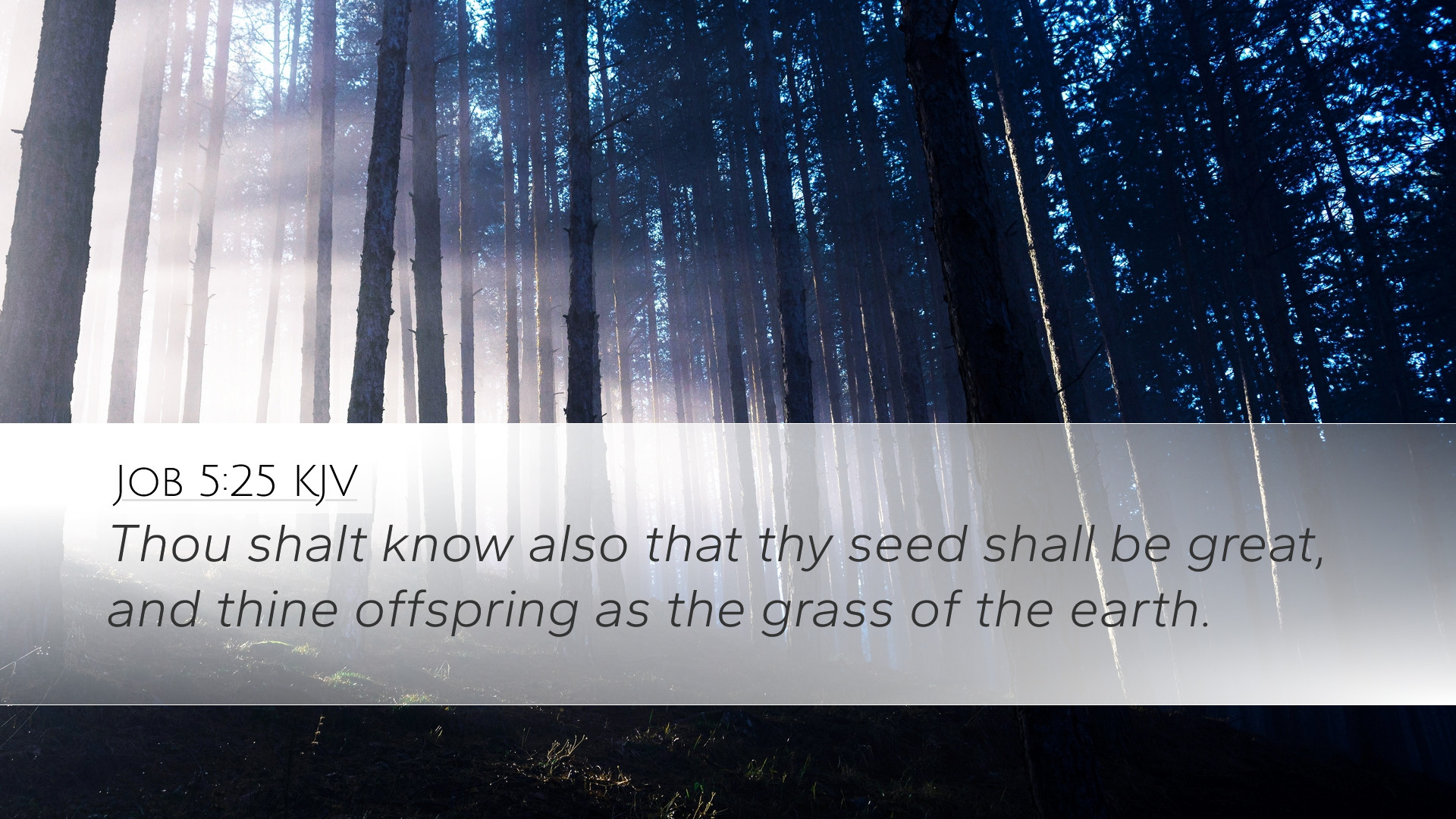Old Testament
Genesis Exodus Leviticus Numbers Deuteronomy Joshua Judges Ruth 1 Samuel 2 Samuel 1 Kings 2 Kings 1 Chronicles 2 Chronicles Ezra Nehemiah Esther Job Psalms Proverbs Ecclesiastes Song of Solomon Isaiah Jeremiah Lamentations Ezekiel Daniel Hosea Joel Amos Obadiah Jonah Micah Nahum Habakkuk Zephaniah Haggai Zechariah MalachiJob 5:25
Job 5:25 KJV
Thou shalt know also that thy seed shall be great, and thine offspring as the grass of the earth.
Job 5:25 Bible Commentary
Commentary on Job 5:25
Introduction
Job 5:25 states, "Thou shalt know also that thy seed shall be great, and thine offspring as the grass of the earth." This verse, nestled in the context of Eliphaz's discourse, reflects upon the nature of God's blessings and the assurance of a fruitful legacy. The commentaries of public domain scholars provide profound insights and theological reflections on this scripture.
Contextual Analysis
To fully appreciate the implications of this verse, it is crucial to explore its surrounding context within the Book of Job, particularly Eliphaz’s response to Job's lamentations.
- Historical Context: The Book of Job grapples with the problem of suffering and divine justice. Eliphaz speaks from the perspective of traditional wisdom, asserting that righteousness leads to blessing.
- Cultural Significance: In the ancient Near Eastern context, offspring were seen as a sign of divine favor. The promise of a prolific posterity resonates deeply with the agrarian society of Job's time.
Insights from Matthew Henry
Matthew Henry emphasizes the *assurance of children* as a distinct blessing. He notes:
- Greatness of Seed: The term "great" relates not just to quantity but to the *prestige* and *valor* of the descendants. It signifies a legacy of influence and righteousness.
- Spiritual Fulfillment: Henry draws a parallel between physical offspring and spiritual progeny. A godly legacy can result in a family that honors God, thus enhancing the perpetuity of faith.
- Comparison with Nature: The simile of "as the grass of the earth" hints at *ephemeral beauty*, suggesting both the *abundance* of life and the *brevity* of it, reminding believers of the transient nature of earthly existence contrasted with eternal value.
Insights from Albert Barnes
Albert Barnes offers a detailed exploration of the spiritual connotations of this verse. Key points from his commentary include:
- The Assurance of Prosperity: Barnes affirms that God's intentions toward the righteous include both temporal and spiritual prosperity. The promise entails not merely the continuation of life but a vibrant faith that influences future generations.
- Symbolism of Grass: Barnes interprets the "grass of the earth" as representing rapid growth and abundance, which metaphorically relates to the believer's potential for witnessing and mentorship within their community.
- Divine Faithfulness: He underscores God's faithful covenants throughout scripture, suggesting that while earthly conditions may fluctuate, God's promises ensure continuity of his blessings across generations.
Insights from Adam Clarke
Adam Clarke's commentary delves into the theological implications of this verse, providing insights that are relevant for both *pastors* and *scholars*:
- Understanding Legacy: Clarke interprets "thy seed shall be great" as an acknowledgment of God's providence. He posits that the righteous may not always see the full manifestation of their legacy during their lifetime, yet faith assures them of its reality.
- Divine Investment in Humanity: He notes that God's blessing upon one's progeny symbolizes His ongoing covenant with humanity, a recurring theme throughout biblical literature.
- Encouragement in Suffering: In the larger narrative of Job, Clarke elucidates that amidst suffering, this promise serves as a bolstering hope – a divine reminder for Job that his tribulations are not in vain but part of a larger purpose.
Theological Reflections
Reflecting on these insights from major commentaries, several theological themes emerge:
- The Nature of Blessing: The notion of blessings extends beyond mere material wealth. It encompasses relational health, spiritual flourishing, and a fruitful legacy.
- God’s Sovereign Plan: The promise of extensive offspring suggests a divine orchestration that transcends immediate challenges. Believers are encouraged to trust in God's overarching plan, which is often invisible in times of hardship.
- Role of the Community: The blessings implied in this verse not only apply to individual families but extend to the broader faith community. Prosperous spiritual heritage contributes to communal growth and strength.
Conclusion
Job 5:25 serves as a beacon of hope and encouragement, illustrating the blessings that accompany righteousness. The insights from Matthew Henry, Albert Barnes, and Adam Clarke bring depth to our understanding of this verse, offering profound implications for faith, legacy, and divine assurance. For pastors and scholars alike, the reflections on this scripture underpin a rich, theological narrative that reassures believers of God's enduring promises amidst life’s uncertainties.


